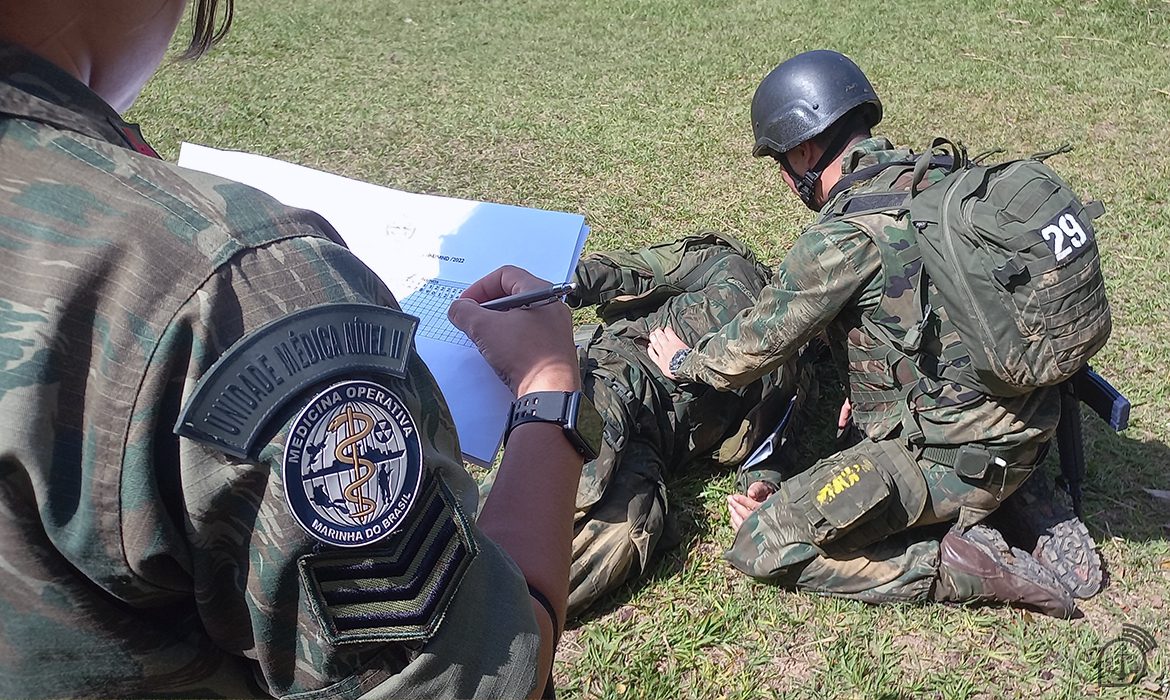Health professionals need to be ready for various fields of action
By First Lieutenant (RM2-T) Thaís Cerqueira – Rio de Janeiro, RJ
In 2022, Brazil received an unprecedented certification from the United Nations (UN) to participate in peacekeeping missions, raising the capacity of the Brazilian Navy’s (MB) troops to level 3. This fact has further increased the need for operational medicine actions and training, since it is present in naval operations, public calamities, and humanitarian and peace missions.
Operative Medicine is a segment of the health area that aims to assist individuals in military operations, in critical or combat environments, where human and material resources – such as supplies, time, place, weather, and epidemiological conditions – may be significantly restricted or adverse. It is based on principles, techniques, and knowledge established by health care in general, but adapted to the peculiarities of military life.
Its capacity for action is quite comprehensive, and can be applied in all environments where MB military personnel operate, as recalled by the Director of the MB Center for Operational Medicine, Sea and War Captain (Physician) Kleber Coelho de Moraes Ricciardi. “We are on land, in the air, and at sea; above and below the waterline; in Peacekeeping and humanitarian Operations; in support of disaster situations; besides always being present on the Antarctic continent.”

Special Course Medical Unit Level II
Today, the date when the Doctor’s Day is celebrated, the peculiarities and characteristics of the doctor in the operational environment are highlighted. This professional requires military training that is appropriate for the functions he needs to perform and that differs from the common medicine practiced in day-to-day hospitals. He must also be able to act and survive in hostile environments, react quickly against fire and explosives, and orient himself in the field, among other challenges.
In order to train personnel in health activities to act in UN Peacekeeping Operations or in response to disasters and in humanitarian aid operations, the MB annually conducts the Special Course Medical Unit Level II. Previously held as training, after reformulation, the course had its first edition in 2019.
The purpose of the course is to prepare Officers and enlisted personnel from the MB, Armed Forces and Auxiliary Forces to perform technical functions as members of a Level Two Medical Unit, activated in support of UN Peacekeeping Operations (PKO), disaster response and humanitarian aid operations, thus providing adequate and integrated assistance and health services, safeguarding human life.
The course, which lasts approximately one month, has a theoretical and practical part and includes activities such as utilitarian swimming, basic survival in the jungle, Escape Training Unit for Submerged Aircraft, and pre-hospital care, among others. First-Lieutenant (Medical) Noelle Gonçalves de Pinho, who was one of the students in the last edition, tells why she decided to take the course. “I want to be able to act in Peace and Humanitarian Operations, situations where people really need us and, therefore, my performance will always be very rewarding”, she reinforced.
According to Sea and War Captain Ricciardi, “after completing this stage, the military will be able to integrate health support for contingents in Peace Operations up to evacuation level II, as well as act in unexpected situations in support of natural or anthropogenic disasters. A recent example of this performance took place earlier this year, with the heavy rains in the region of Petrópolis (RJ).

The UN has several levels of evacuation and each stage has a certain model of medical care. At Level I, the capacity is for basic life support and patient stabilization, with a maximum capacity for two days of hospitalization and patient observation. In the Medical Unit Level II, the structure of a small hospital is created, with surgical capacity, attendance with several medical specialties and conditions for hospitalization for a longer period and with more beds available.
Source: Agência Marinha de Notícias *** Translated by the DEFCONPress FYI Team ***
